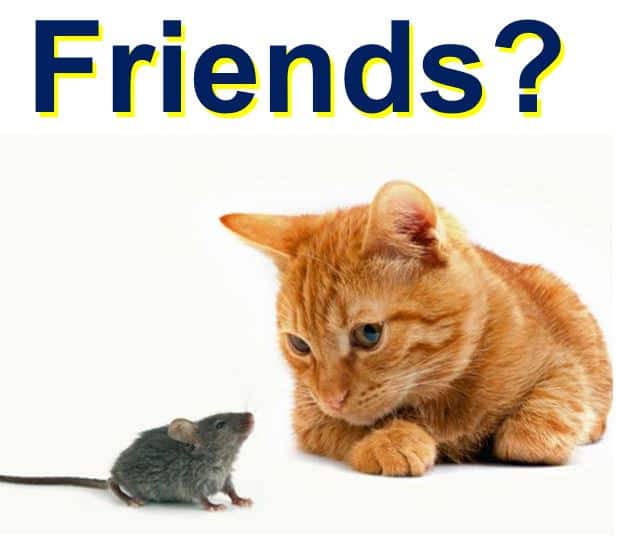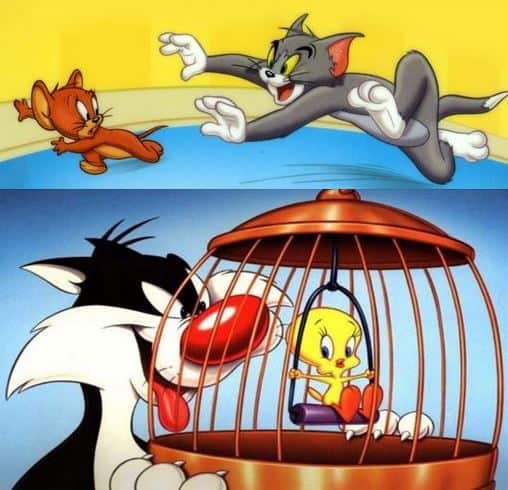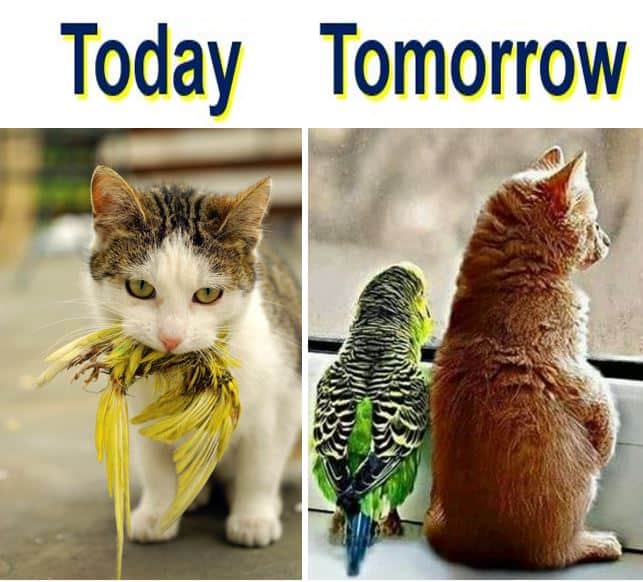Cats could lose their hunting instinct thanks to genetic engineering, says a feline expert, who predicts that soon the sight of your Burmese, Siamese, Persian or Tabby bringing dead carcasses into the house could be gone.
Genetic engineering refers to the manipulation of an organism’s DNA to change its characteristics (phenotype).
Before protesting about tweaking with a perfectly natural instinct and the perils of playing God with nature, bear in mind that hundreds of millions of creatures just in the UK are killed by domestic cats annually. The RSPB says that the Mammal Society estimates that British cats catch and kill up to 275 million animals each year, of which 55 million are birds – and in most cases they don’t eat them.
Feline expert Dr. John Bradshaw, who works at Bristol University’s School of Veterinary Sciences, explained that domestic cats may soon become genetically engineered to remove their hunting instinct.
 Imagine a future world where cats and mice are friends! (Image: americanbanker.com)
Imagine a future world where cats and mice are friends! (Image: americanbanker.com)
Dr. Bradshaw, whose specialist area of research is anthrozoology (the science of human-animal interactions), said only between fifteen and twenty cat genes are involved in driving the animal’s propensity to hunt. We could edit those genes to yield a more ‘peaceful’ animal, as far as birds, mice and other small creatures are concerned.
Cats prefer eating pet food
At the Cheltenham Science Festival, Dr. Bradshaw said:
“The distaste we have towards blood and flesh and death – most people don’t like it. If people become more offended by cats bringing prey into their home then fewer people will want to have cats. Cats are such fascinating animals so that would be a pity.”
Modern domestic cats enjoy killing prey and eating the pet food their owners give them. In fact, they prefer their cat food to eating birds or mice – i.e. they usually decline to eat their prey.
 Will children in the future watch oldie cartoons – like Tom & Jerry (top) and Silvester & Tweety – and be confused about the behaviour of the cats? Will it be as unlikely for them as for us today watching a bunny rabbit hunting birds and mice?
Will children in the future watch oldie cartoons – like Tom & Jerry (top) and Silvester & Tweety – and be confused about the behaviour of the cats? Will it be as unlikely for them as for us today watching a bunny rabbit hunting birds and mice?
Dr. Bradshaw, who wrote the best-selling book – Cat Sense (see YouTube video below) – believes that cats should be prevented from killing wild prey if they do not need them to survive. He adds that cats are often scapegoated, and in his opinion, unfairly.
Dr. Bradshaw said:
“People who don’t like cats are always going to blame them. So to make that go away, we need to do something about it. We need to select cats that don’t hunt.”
It is common to find two nearly identical cats, one is a natural hunter and kills lots of prey, while the other never kills anything. This suggests that the difference is determined by genetic variation, he said.
Scientists have already sequenced the entire cat genome, so it should be possible to find and alter the genes that make them hunt.
Wild predators do not have pet food option
Dr. Bradshaw said:
“I think it would be a commercial product. You have then taken away a bit of the catness of the cat, but I think that’s unavoidable.”
“We need to reserve those hunting territories for wild predators because they have nowhere else to go, whereas our cats have full nutrition.”
Number of animals killed could be higher
The Mammal Society’s figure of 275 million animals killed by pet cats in the UK each year refers just to those we know about, the ones our pets bring into the house or we see outside. We have no idea how many more are caught and we did not see, or escaped but subsequently died.
The Mammal Society says that the most frequently caught birds are probably house sparrows, blackbirds, blue tits and starlings.
 Imagine a world where cats and little birds live peacefully together.
Imagine a world where cats and little birds live peacefully together.
Cats probably not a threat to wildlife populations
Even though cats kill a huge number of birds each year, the RSPB says there is no scientific evidence suggesting that predation by cats in gardens is having a negative impact on British bird populations.
Millions of birds die naturally each year, mainly through disease, starvation or other forms of predation. Evidence suggests that cats tend to go for sickly or weak birds.
According to the RSPB:
“It is likely that most of the birds killed by cats would have died anyway from other causes before the next breeding season, so cats are unlikely to have a major impact on populations. If their predation was additional to these other causes of mortality, this might have a serious impact on bird populations.”
“Those bird species that have undergone the most serious population declines in the UK (such as skylarks, tree sparrows and corn buntings) rarely encounter cats, so cats cannot be causing their declines. Research shows that these declines are usually caused by habitat change or loss, particularly on farmland.”
Video – Dr. Bradshaw’s book ‘Cat Sense’
Dr. Bradshaw talks about his book – Cat Sense – which is a scientific account of what it is like to be a cat.

